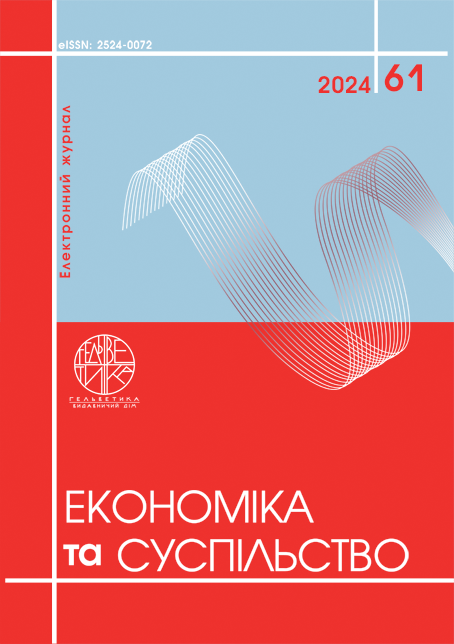CURRENT PROBLEMS AND PROSPECTS OF THE FORMATION OF THE PROFESSIONAL COMPETENCE OF STAFF IN GLOBALIZATION
Abstract
Successful business management primarily depends on the professional competence of the staff, since a high level of professionalism is the foundation of human development and progress of society. The modern context requires special qualities and competencies from the staff. The purpose of the study is to identify modern problems and outline the prospects for the development of professional competence of personnel in the conditions of globalization. The article outlines the key trends in the personnel management system in the context of globalization. Challenges associated with variability, uncertainty, complexity and ambiguity, rapid changes in the employment sphere have been identified. A set of attitudes has been formed, which are an important factor in personnel activity, regulate personality orientation, social behavior, consciousness and world perception, shape professional activity in the modern world and attitude to success in personnel. The key components of professional competence under the conditions of globalization and its development prospects are highlighted. It is emphasized that human resources in the global era must have competencies related to globalization itself. It is confirmed that successful professional activities are largely based on the ability to communicate, share and use information to solve complex problems, the ability to adapt and innovate in response to new demands and changing circumstances, and to expand the capabilities of technology to create new knowledge. It was determined that professional competence in the conditions of globalization allows to study local, global and intercultural problems, to understand and evaluate different points of view and worldviews, to interact successfully and respectfully with others, as well as to take responsible measures for sustainable development and collective well-being, to thrive in a changing market labor As a result of the study, the key competencies of the staff were highlighted, in particular, critical thinking and problem-solving skills; communication and cooperation; development of digital competences; digital literacy and technology fluency; effective communication and the ability to work in multicultural teams; creativity and entrepreneurial thinking; the ability to change and constantly improve.
References
Вартанова О. В. Професійна компетентність персоналу: сучасні вимоги та підходи до формування. Проблеми системного підходу в економіці. 2017. Вип. 5. С. 97–102. URL: http://nbuv.gov.ua/UJRN/PSPE_print_2017_5_16
Лаврук О.С. Управління формуванням професійної компетенції персоналу підприємств. Збірник наукових праць Подільського державного аграрно-технічного університету. Економічні науки. 2016. Вип. 24. Ч. 3. С. 116–121.
Antonova, O., Pavlenko, V., Myronchuk, N., Kovalchuk, V., Biruk, N. (2023) Formation of Professional Competence of a Specialist in a Globalized World: Contemporary Problems and Prospects. AD ALTA: Journal of Interdisciplinary Research, 13/01-XXXIII, 105–110. URL: https://www.magnanimitas.cz/ADALTA/110221/papers/A_23.pdf
Barry, M. (2012) What skills will you need to succeed in the future? Phoenix Forward (online). Tempe, AZ, University of Phoenix
Klein, J., Wikan, G. (2019) Teacher education and international practice programmes: Reflections on transformative learning and global citizenship. Teaching and Teacher Education, 79, 93–100.
Overchuk, V., Smulson, M., Liashch, O., Ihnatovych, O., Kovalova, O., Smokova, L. (2022) Personal factors of psychological well-being in conditions of socioeconomic instability. AD ALTA: Journal of Interdisciplinary Research, 12/02-XXXI, 167-172. URL: https://www.magnanimitas.cz/ADALTA /120231/papers/A_29.pdf.
Romaniuk, R., Antonova, O., Sorochynska, O., Tsurul, O., Sidorovich, M. (2021) The essence and mechanisms of environmental competence formation in students of natural science departments. E35 Web of Conferences. Volume 280. URL:https://www.e3s-conferences.org/articles/e3sconf/abs/2021/56/e3sconf_icsf2021_09004/e3sconf_icsf2021_09004.html
Pierce, D. (2020) Striving for global competence. Community College Journal, 90(5), 12–17.
Jurabekova, X. M. (2022) The role of language knowledge in professional competence of students. Web of Scientist: International Scientific Research Journal, 3(02), 996–1000.
Wager, T. (2010) Overcoming The Global Achievement Gap (online). Cambridge, Massachusetts, Harvard University.
Vartanova O. V. (2017) Profesiyna kompetentnist personalu: suchasni vymohy ta pidkhody do formuvannya [Professional competence of personnel: modern requirements and approaches to formation]. Problemy systemnoho pidkhodu v ekonomitsi – Problems of the systemic approach in economics, vol. 5, pp. 97–102. Available at: http://nbuv.gov.ua/UJRN/PSPE_print_2017_5_16 (accessed April 1, 2024).
Lavruk O.S. (2016) Upravlinnya formuvannyam profesiynoyi kompetentsiyi personalu pidpryyemstv [Management of formation of professional competence of enterprise personnel]. Zbirnyk naukovykh prats Podilskoho derzhavnoho ahrarno-tekhnichnoho universytetu. Ekonomichni nauky – Collection of scientific works of the State Agrarian and Technical University in Podillya. Economic sciences, vol. 24, part. 3, pp. 116–121.
Antonova, O., Pavlenko, V., Myronchuk, N., Kovalchuk, V., Biruk, N. (2023) Formation of Professional Competence of a Specialist in a Globalized World: Contemporary Problems and Prospects. AD ALTA: Journal of Interdisciplinary Research, 13/01-XXXIII, 105–110. Available at: https://www.magnanimitas.cz/ADALTA/110221/papers/A_23.pdf (accessed April 5, 2024).
Barry, M. (2012) What skills will you need to succeed in the future? Phoenix Forward (online). Tempe, AZ, University of Phoenix.
Klein, J., Wikan, G. (2019) Teacher education and international practice programmes: Reflections on transformative learning and global citizenship. Teaching and Teacher Education, 79, 93–100.
Overchuk, V., Smulson, M., Liashch, O., Ihnatovych, O., Kovalova, O., Smokova, L. (2022) Personal factors of psychological well-being in conditions of socioeconomic instability. AD ALTA: Journal of Interdisciplinary Research, 12/02-XXXI, 167–172. Available at: https://www.magnanimitas.cz/ADALTA /120231/papers/A_29.pdf (accessed April 3, 2024).
Romaniuk, R., Antonova, O., Sorochynska, O., Tsurul, O., Sidorovich, M. (2021) The essence and mechanisms of environmental competence formation in students of natural science departments. E35 Web of Conferences, vol. 280. Available at: https://doi.org/10.1051/e3sconf/202128009004 (accessed April 2, 2024).
Pierce, D. (2020) Striving for global competence. Community College Journal, 90(5), 12–17.
Jurabekova, X. M. (2022) The role of language knowledge in professional competence of students. Web of Scientist: International Scientific Research Journal, 3(02), 996–1000.
Wagner, T. (2010) Overcoming The Global Achievement Gap (online). Cambridge, Massachusetts, Harvard University.

This work is licensed under a Creative Commons Attribution 4.0 International License.


